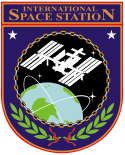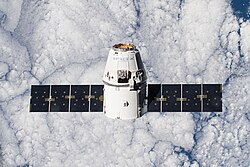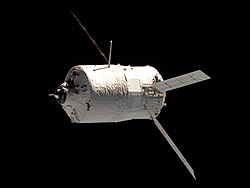Cygnus Orb-D1
| S.S. G. David Low | |||
 | |||
| Beställare | NASA | ||
|---|---|---|---|
| Uppkallad efter | G. David Low | ||
| Tillverkare | Orbital Sciences Corporation Thales Alenia Space | ||
| Modell | Cygnus standard | ||
| Operatör | Orbital Sciences Corporation | ||
| Färdens tid | 35 dagar, 2 timmar | ||
| NSSDC-ID | 2013-051A[1] | ||
| Uppskjutning | |||
| Startplats | MARS LP-0A | ||
| Raket | Antares 110 | ||
| Uppskjutning | 18 september 2013, 14:58 UTC | ||
| Återinträde | |||
| Återinträde | 23 oktober 2013, 18:16 UTC | ||
| Omloppsbana | |||
| Apogeum | 426 km | ||
| Perigeum | 419 km | ||
| Banlutning | 51,65° | ||
| Varv | 545 st[2] | ||
| Dockning | |||
| Rymdstation | ISS | ||
| Greppad | 29 september 2013, 11:00 UTC | ||
| Dockning | 29 september 2013, 12:44 UTC | ||
| Dockningsport | Harmony Nadir | ||
| Ur dockning | 22 oktober 2013, 10:04 UTC | ||
| Släppt | 22 oktober 2013, 11:31 UTC | ||
| Tid dockad | 22 dagar, 21 timmar, 20 minuter | ||
| Kronologi | |||
| |||
Cygnus Orb-D1 även känd som Cygnus 1 eller Orbital Sciences COTS Demo Flight, var första test flygningen av företaget Orbital Sciences Corporation rymdfarkost Cygnus. Farkosten var uppkallad efter den avlidne amerikanske astronauten G. David Low. Uppskjutningen gjordes med en Antaresraket den 18 september 2013. Den 29 september samma år dockades farkosten med rymdstationen ISS, med hjälp av Canadarm2. Farkosten lämnade rymdstationen den 22 oktober 2013 och brann upp i jordens atmosfär den 23 oktober 2013.
Källor
Fotnoter
- ^ ”NASA Space Science Data Coordinated Archive” (på engelska). NASA. https://nssdc.gsfc.nasa.gov/nmc/spacecraft/display.action?id=2013-051A. Läst 24 mars 2020.
- ^ Manned Astronautics - Figures & Facts Arkiverad 5 oktober 2015 hämtat från the Wayback Machine., läst 28 juli 2016.
| ||||||||||||||||||||||
| ||||||||||||||||||||||||||||||||
Media som används på denna webbplats
A Progress supply ship linked up to the orbiting International Space Station (ISS) at 3:48 GMT, November 18, bringing Expedition 1 commander William M. Shepherd, pilot Yuri P.
Gidzenko and flight engineer Sergei K. Krikalev two tons of food, clothing, hardware and holiday gifts from their families. The photograph was taken with a 35mm camera and the film was later handed over to the STS-97 crew members
for return to Earth and subsequent processing.Backdropped by a cloud-covered part of Earth, the Orbital Sciences' Cygnus cargo craft approaches the International Space Station, photographed by an Expedition 40 crew member. The two spacecraft converged at 6:36 a.m. (EDT) on July 16, 2014.
ISS021-E-017623 (30 Oct. 2009) --- Backdropped by a cloud-covered part of Earth, the unpiloted Japanese H-II Transfer Vehicle (HTV), filled with trash and unneeded items, departs from the International Space Station. European Space Agency astronaut Frank De Winne, Expedition 21 commander; NASA astronaut Nicole Stott and Canadian Space Agency astronaut Robert Thirsk, both flight engineers, used the station's Canadarm2 robotic arm to grab the HTV cargo craft and unberth it from the Harmony node's nadir port. The HTV was successfully unberthed at 10:18 a.m. (CDT) on Oct. 30, 2009, and released from the station's Canadarm2 at 12:32 p.m.
This image, photographed by one of the Expedition 42 crew members aboard the International Space Station, shows the SpaceX Dragon cargo craft approaching on Jan. 12 2015 for its grapple and berthing and the start of a month attached to the complex. Dragon carried more than 2 ½ tons of supplies and experiments to the station.
ISS026-E-037172 (24 Feb. 2011) --- Surrounded by the blackness of space, the European Space Agency's "Johannes Kepler" Automated Transfer Vehicle-2 (ATV-2) approaches the International Space Station. Docking of the two spacecraft occurred at 10:59 a.m. (EST) on Feb. 24, 2011.
ISS037-E-003717 (29 Sept. 2013) --- The Canadarm2 moves toward the first Cygnus commercial cargo spacecraft built by Orbital Sciences Corp. as it approaches the International Space Station. The two spacecraft converged at 7:01 a.m. EDT on Sept. 29, 2013.
The Expedition 37 crew captured Cygnus with the Canadarm2 at 7 a.m. EDT Sunday, Sept. 29, 2013, and attached it to the Harmony node at 8:44 a.m.










